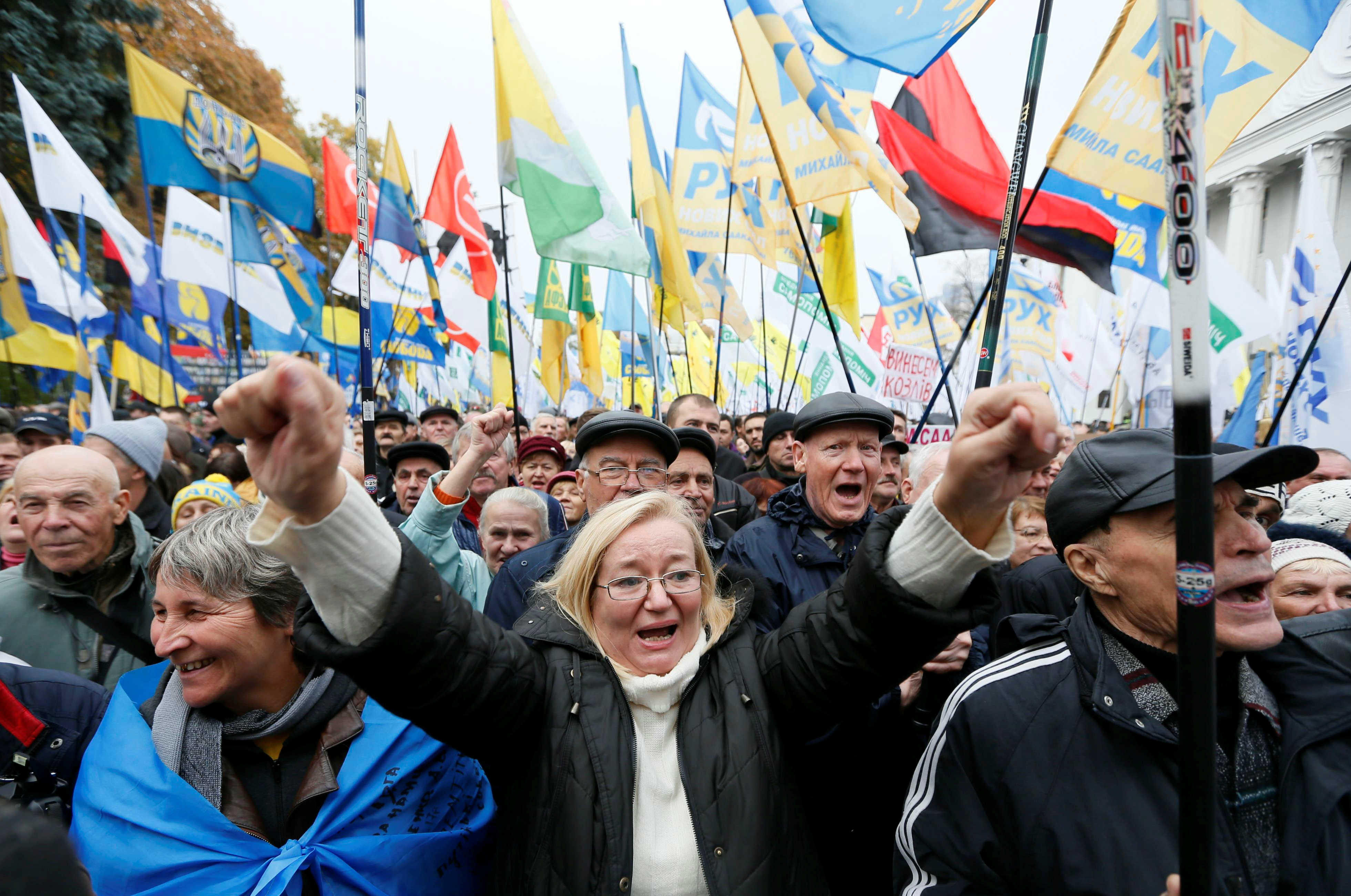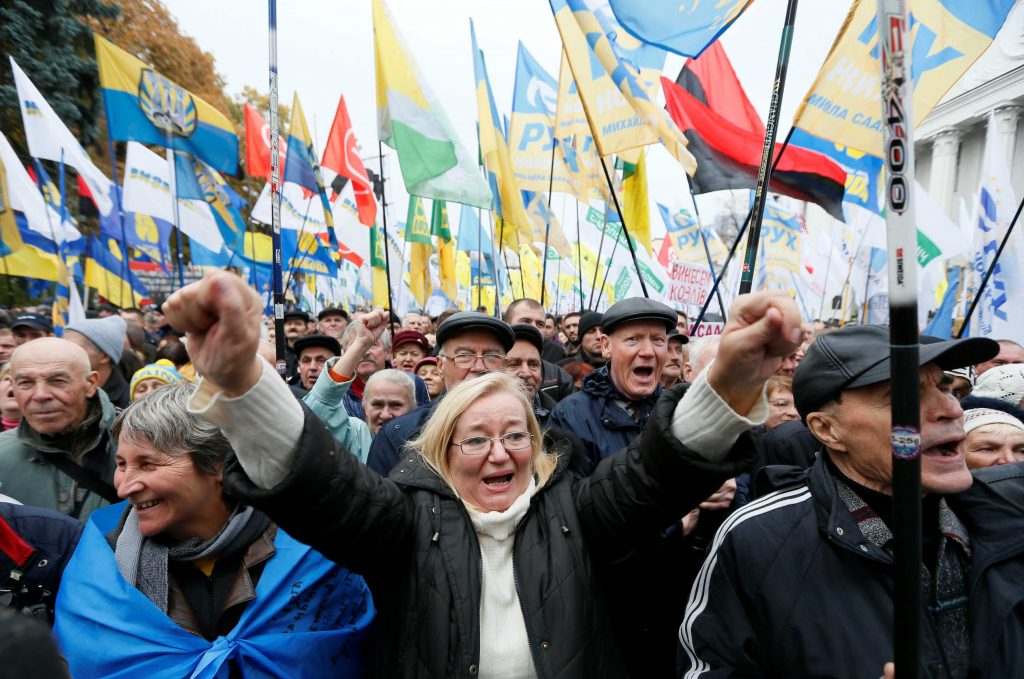
On October 19, several thousand protesters in Kyiv cheered as parliament passed a bill that will lift parliamentary immunity. It was not the only victory of the day; parliament approved major health care reform as well.
This was the third day that thousands of Ukrainians have taken to the streets to demand that President Petro Poroshenko establish an independent anticorruption court, change the electoral law, and lift parliamentary immunity or resign. The protests, which began on October 17, are the largest since the 2014 Revolution of Dignity, which prompted former President Viktor Yanukovych to flee to Moscow and brought a pro-Western government to power. Since then, Ukraine has made serious but halting progress, thanks in large measure to Ukraine’s outspoken activists.
Protesters have been mainly holding signs and waving flags in front of the parliament building. Thousands of national guardsmen and riot police, probably ten times the number of actual protesters, have surrounded the building and put up barriers. Some see this as a signal that Poroshenko is afraid of the opposition.
The crowd has been diverse and has included anticorruption activists, political parties, LGBT activists, and older voters. Most of the major opposition parties have been on the streets. Petro Poroshenko Bloc deputies Mustafa Nayyem, Sergii Leshchenko, and Svitlana Zalishchuk have also been spotted in the crowd.
After the recent legislative victories, many major civil society organizations, including the Reanimation Package of Reforms, Chesno, DemAlliance, and Hromadyanska Platforma, called it quits and left the protest. But others are digging in. Former president of Georgia and Odesa Oblast governor Mikheil Saakashvili, who helped organize the protests, and Samopomich deputies Yegor Sobolev and Semen Semenchenko are staying put, although they are not officially representing the party.
Nayyem, the BPP MP, called the immunity bill “a small victory,” but it’s probably better to focus on the word small rather than the concept of victory. The legislation has been referred to the Constitutional Court, which is a delay tactic, said Maxim Eristavi, a nonresident fellow at the Atlantic Council. In fact, two bills that would lift immunity were put into play, but the second one—submitted by the presidential administration—would only lift immunity in 2020, after the 2019 presidential and parliamentary elections. Like always, the fine print matters.
While not an explicit demand of the protesters, the health care reform that was just passed was game-changing and has been long recommended. Meanwhile, parliament failed to pass electoral reform.
The most difficult and important of the crowd’s demands—the anticorruption court—has been a source of contention for months, and isn’t something that parliament is even considering. Poroshenko has fiercely resisted the court, in spite of serious pressure from the international community and conditionality demands from the International Monetary Fund. In early October, he changed his mind and promised to move quickly on the issue by the end of the year.
Simply in terms of the crowds that they’ve mobilized, the demonstrations are significant. “The protests are clearly a success, but how this success will be harnessed is unclear,” said Anders Åslund, a senior fellow at the Atlantic Council.
Indeed, the real question is whether the protests will give reformers in parliament any additional leverage, said Eristavi, adding that interested observers should closely watch forthcoming parliamentary negotiations.
“‘Compromise’ is still a dirty word among progressive forces in Ukraine. But as the country is leaving the Maidan revolution behind, the opposition and civil society must switch from confrontational idealism to constructive political dialogue. Every democratic consolidation on the continent was achieved through smart tradeoffs with old elites,” Eristavi said. “But as the last [few] days showed, there’s lack of mature political strategies in the camp of progressive forces. Mobilizing street action is still the ultimate endgame and main political tool for them.”
But even whether the crowd will be willing to stick around is unknown. Some have erected tents and slept on the streets for two nights, but crowds are sparse in the evenings. The formation of an anticorruption court is important to many of the protesters, but as an intangible demand, it will be hard to mobilize large crowds and keep people on the streets over the issue, especially as temperatures fall.
And the fact that a portion of the group has already left bodes badly for progressive forces, says Kateryna Smagliy, director of the Kennan Institute in Kyiv. “They started together, but then some groups decided to leave. This is a bad sign. Because unity is always critical. You should not start something with your partners, unless you plan to defend your campaign until the very end.”
It’s too soon to know if the protests will give wind to reformers’ sails, but for the time being, they at least spurred parliament to finally pass health care reform and move on parliamentary immunity.
Two tangible steps.
Melinda Haring is the editor of the UkraineAlert blog at the Atlantic Council. She tweets @melindaharing.
Image: Supporters of former Georgian President Mikheil Saakashvili and different political parties attend a rally demanding an electoral reform, in front of the Ukrainian parliament in Kyiv, Ukraine October 17, 2017. REUTERS/Valentyn Ogirenko
